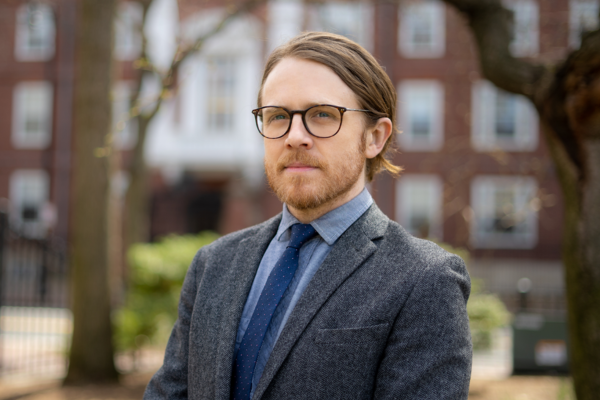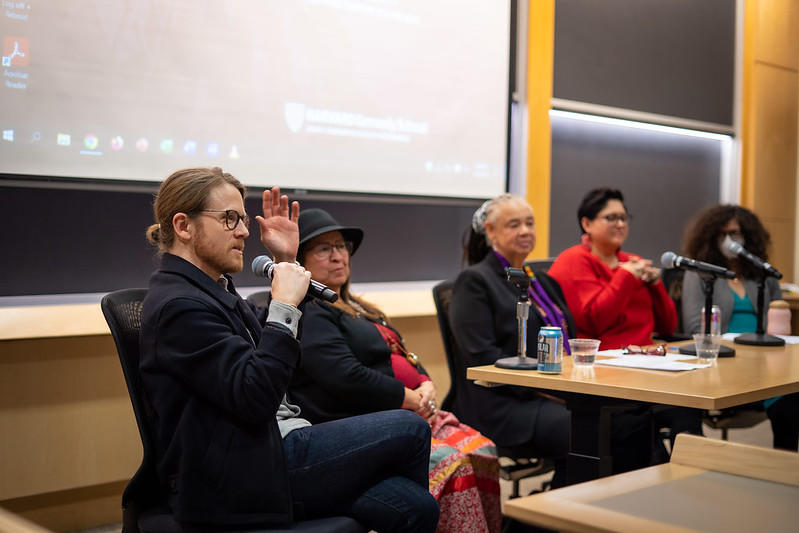Veteran storyteller pushes for new narrative
Film director and producer Ian Daniel MC/MPA 2023 looks to policy to help change the trajectory of centuries-old injustice.
Ian Daniel MC/MPA 2023 has always had an eye and ear for stories.
Whether walking the halls of NBC’s TODAY show or living aboard the Waterpod Project — a floating, futuristic self-sustaining activist art installation in New York City’s East River — Daniel is called to projects and people with a unique point of view.
“I have endless curiosity,” says Daniel. It’s a drive that allows him to see narratives that others miss.
On one of his recent projects, Daniel helped tell the story of LGBTQ culture around the world as co-host and executive producer of the Emmy-nominated TV show GAYCATION. Daniel, along with actor Elliot Page, started GAYCATION with the intention of focusing on subject’s personal experiences, but they soon realized that it was impossible to do so absent a broader discussion about the political landscape and its impact on the LGBTQ community.
“We wanted to highlight these stories and get to the truth of the LGBTQ experience and just really understand people’s trauma, resilience, and triumphs. Then, I started realizing we were really talking about how policies were impacting these people’s lives. The policies in place were creating systemic harm.”
His next project helped refine his use of storytelling as a tool for engaging in policy discussions. Daniel found himself journeying alongside polluted waters and sitting down in the living rooms and meeting spaces of Indigenous and Black activists in Nova Scotia for a documentary on environmental racism he co-directed with Page called There’s Something in the Water. Through the film, “I started seeing clearly where policy and humanity were connected,” recalls Daniel.

Driven in part by these experiences, Daniel came to Harvard Kennedy School, to deepen his understanding of policymaking and analysis. He was awarded the Ash Center for Democratic Governance and Innovation’s Roy and Lila Ash Scholarship in Democracy.
“Seeking out and placing value in the telling of individual life experiences is a crucial trait for policymakers and public leaders who are committed to healthy democracy,” says Ash Center Executive Director of Programs Tim Glynn-Burke. “It was clear that Ian’s unique background as a storyteller committed to justice and democracy would add tremendous value to the Kennedy School community.”
The education and experiences Daniel pursued at the Kennedy School became a pathway for him to work towards healing some of the pain and injustice he had uncovered in his many years of storytelling. “Learning about policy is a doorway into really understanding how people suffer and how to stop suffering,” he says.
Through his coursework, Daniel focused much of his time at HKS exploring avenues for civil resistance, decolonization and reparations. He credits courses like Professor Erica Chenoweth’s “Civil Resistance: How It Works” for helping to broaden his perspective on social movements, and courses like Professor Cornell Brooks’s “Creating Justice in Real Time: Vision, Strategies and Campaigns” and Eric Henson’s “Native Americans in the 21st Century: Nation Building II” for giving him real-time experience allying with groups working directly to address injustice.

Daniel also worked hard to bring some of the voices and perspectives from his media career to Harvard. He is co-founder of the Harvard Anti-Racism Policy Caucus, and served as co-editor of the Harvard Anti-Racism Policy Journal and as a senior researcher focused on documentary film at the Shorenstein Center on Media, Politics, and Public Policy, lifting new voices on anti-racism and art. He helped organize a film screening with the Ash Center and helped bring the Nova Scotia Indigenous and Black activists to campus to tell their stories.
“Ian and Elliot Page’s fantastic documentary There’s Something in the Water is a powerful example not only of the importance of art in policy and advocacy, but also about how to center the voices of directly-affected communities leading the struggle for justice,” notes Professor Yanilda González, an expert on policing, state violence, inequality, and citizenship in democracy, who worked with Daniel to organize the screening.
Daniel also partnered with the Shorenstein and Ash Centers to celebrate transgender, non-binary, and gender-nonconforming people and discuss their representation (or lack thereof) in the media as well as host a discussion about strategies for developing and implementing an anti-racist agenda in various sectors of modern society.
Looking back, he sees his experience at the Kennedy School as central to his work telling new stories about the impacts of racism, white supremacy, and colonialism on historically marginalized communities. “I think we’re learning about how to not only repair, but also how to emerge a different story, to lift submerged perspectives, how to decolonize the narrative.”
As he walks across the stage this May, Daniel isn’t sure which exact story he’s going to tell next, but he knows he’ll continue grappling with many of the questions he started answering over the past year.
“How do we look at historical harms, acknowledge them, make systemic changes to repair them. And make sure they don’t happen again,” says Daniel. “How do we use policy to do that? But how do we also use stories to create emergent alternatives? How do we use our gifts of human connection to heal each other and our planet?”